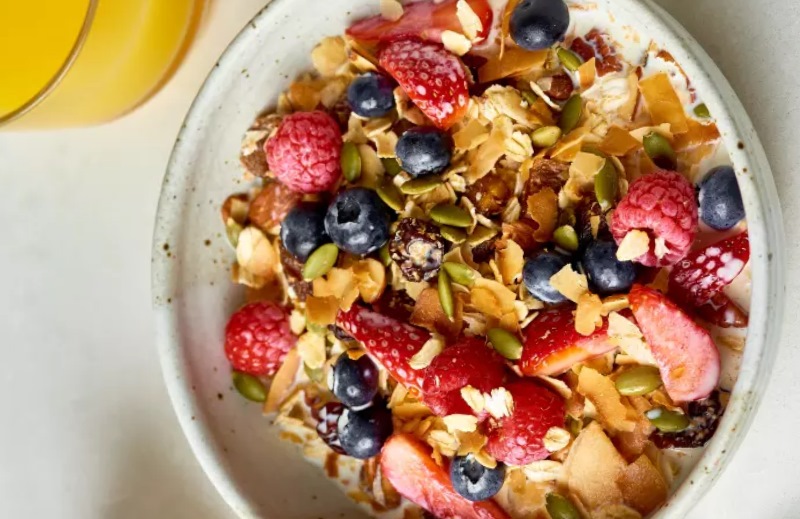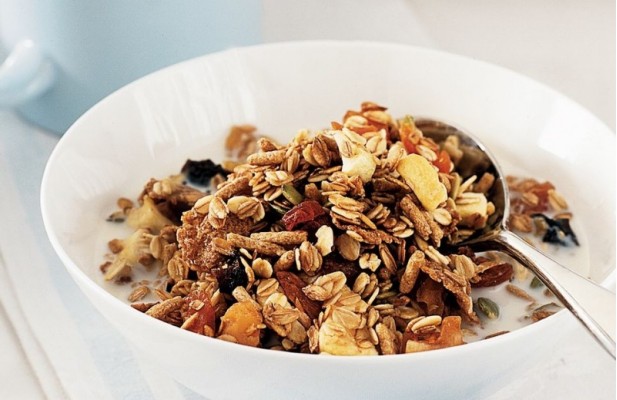The 9 Benefits of Muesli That Make It a Great Breakfast Option

You’ve heard it before, and you’ll hear it again. Breakfast
is kindof a big deal.
Studies show that eating breakfast can reap enormous
benefits, like helping improve cognitive function, boosting your heart health,
decreasing your risk for heart disease, and even boosting energy levels.
Of course, you can’t just roll through the McDonald’s
drive-thru or inhale a pop tart and go on with your day. You need to begin your
morning by eating something nutritious, natural, and filling. Otherwise, you’ll
be stuck consuming useless calories, which will only leave you hungry an hour
later.
So, what should you be digesting so early in the morning?
While you may be expecting the right answer to be oatmeal, a smoothie, or
yogurt with fruit, we’re suggesting something a little different: muesli.
If you’ve never heard of it, you’re not alone. But you’re
also missing out on a food with some health benefits you should be taking
advantage of.
What Is Muesli,
Anyway?
Muesli (pronounced Mews-li) is a fiber- and protein-rich
breakfast and brunch option based on raw, rolled oats and other diverse
breakfast ingredients.
What began as a dry cereal made from toasted whole oats,
nuts, fruit, and wheat flakes, muesli has evolved to become a hodgepodge of a
breakfast option with tons of combinations that can be soaked and essentially
marinated overnight. Think grains, fresh or dried fruits, seeds, and nuts. The
concoction, which is full of vitamins, iron, and magnesium, can also be mixed
together with milk (soy, almond, or cow), or yogurt or fruit juice, and left in
the fridge overnight.
Muesli is often likened to granola, but it’s typically a
more natural option with less sugar, making it the healthier option of the two.
So, why else should you favor this mish-mash first thing in the morning? Here
are eight other reasons you should be waking up to muesli tomorrow morning.
It’s
Healthier Than Other Cereals
Sugary cereals and delicacies from your local doughnut shop
may be tempting, but they’re full of sugar, and who knows what else.
Muesli often has less sugar and fewer calories than pastries
and breakfast sandwiches. Plus, since you control your concoction, you can make
sure nothing processed or full of sugar makes its way into your meal.
It’s High
in Fiber and Whole Grains
While it’s hard to gauge exactly how much fiber is in muesli
because there are so many different combinations one can make, the dish is
typically high in fiber and whole grains — both of which are good for your
digestive system. Fiber and whole grains can regulate your digestive tract.
You’ll
Stay Fuller, Longer
Not only do fiber and whole grains help keep your tummy in
check, they’re also filling. You won’t find yourself starving for a doughnut
shortly after eating.
Additionally, raw oats contain a ton of resistant starch,
making muesli an extremely filling breakfast that takes a long time to digest.
As the resistant starch is broken down in your stomach, digestive acids that
suppress your appetite are released and your metabolism speeds up, so you’ll
burn more calories in less time.
Data from the NHANES study revealed that oat consumption is
related to a lower weight in adults.
It’s Good
for Your Heart
Muesli contains oat bran, which includes an oat fiber called
beta-glucan.
According to studies, beta-glucan can help reduce
cholesterol levels by up to 10 percent. By eating muesli regularly, you’ll be
drastically improving your heart health. Do your heart another favor and add
lemon juice to your mixture. Adding vitamin C can help lower your cholesterol
too, boosting your heart health even more.
You’ll
Consume More Nutrients
Since you can essentially marinate muesli like a steak by
soaking it overnight, the good nutrients have more time to get absorbed. Any
“antinutrients” that interfere with digestive enzymes or inhibit mineral
absorption can become deactivated.
While cooking food can have a similar effect on these
antinutrients, soaking your food makes it even easier to digest.
It’s
Satisfying
Remember beta-glucan? Well, it can do more than reduce your
cholesterol. Not only is it full of fiber, but adding
beta-glucan to your baking products like muffins, cakes, pasta, noodles, or
muesli, can affect their attributes like thickening ability, texture, and
appearance.
Studies have found that in addition to contributing to the
attributes and nutritional value of a product, beta-glucan can improve the
sensory and gustatory properties of some products. That means it just might
satisfy any cravings that come up — even before the sun does!
You Can
Add Protein
And pretty much whatever else you want! Adding nuts can
incorporate protein and omega-3 fatty acids into your breakfast, while other
ingredients like fruit can give you a healthy dose of potassium, fiber, vitamin
E, C, B-12, and more.
Milk or dairy alternatives like almond milk, flax milk,
soymilk, or yogurt that you’ll typically soak your oats in are another way to
incorporate dairy and protein. Basically, whatever it is that you need to start
your day off right, you can incorporate into your meal — whether it’s a base
you soak your oats in, or a topping you can stir in.
You’ll
Avoid Eating Something Unhealthy
By choosing muesli as your go-to breakfast, you’ll save
yourself from potentially eating something fattening or full of sugar that
could damage your health, and your waistline.
With muesli, you’ll be making a smart breakfast decision that will benefit you all day long.
The
Takeaway
The best thing about muesli, however, is that it’s trendy —
and not just because it’s healthy.
Muesli is the perfect meal to stash in a mason jar overnight in your fridge and bring into work the next day. Not only will your coworkers take note of your modern, rustic ways, but you’ll have a filling, healthy breakfast (or snack!) waiting for you whenever you’re ready.



Leave your comment